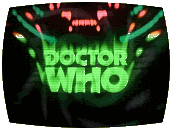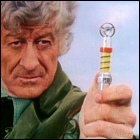 Instead of arriving on the fabled blue planet, Metebelis 3, the Doctor and Jo materialize on board a ship in the Indian Ocean in what appears to be 1926. They soon discover, however, that they are in fact trapped in a “miniscope” – a transdimensional “ant farm” in which the humans are but one exhibit. The miniscope is the property of the rapscallion Vorg, a sort of cosmic carny from the planet Lurman who, with his assistant Shirna, is the first off-world visitor to the planet Inter Minor. He is not welcome there, as the local ruling class – officious, humorless bureaucrats – fail to find his portable zoo entertaining and fear that it may teem with germs and contagion. While Vorg awaits deportation and tries to rescue his “collection” (which include a few Ogrons and some nasty giant carnivorous worms called Drashigs), the Doctor finally emerges from the machine – inadvertently abetting the escape of the horrible Drashigs behind him.
Instead of arriving on the fabled blue planet, Metebelis 3, the Doctor and Jo materialize on board a ship in the Indian Ocean in what appears to be 1926. They soon discover, however, that they are in fact trapped in a “miniscope” – a transdimensional “ant farm” in which the humans are but one exhibit. The miniscope is the property of the rapscallion Vorg, a sort of cosmic carny from the planet Lurman who, with his assistant Shirna, is the first off-world visitor to the planet Inter Minor. He is not welcome there, as the local ruling class – officious, humorless bureaucrats – fail to find his portable zoo entertaining and fear that it may teem with germs and contagion. While Vorg awaits deportation and tries to rescue his “collection” (which include a few Ogrons and some nasty giant carnivorous worms called Drashigs), the Doctor finally emerges from the machine – inadvertently abetting the escape of the horrible Drashigs behind him.
written by Robert Holmes
directed by Barry Letts
music by Dudley SimpsonGuest Cast: Stuart Fell (Functionary), Michael Wisher (Kalik), Terence Lodge (Orum), Cheryl Hall (Shirna), Leslie Dwyer (Vorg), Tenniel Evans (Major Daly), Andrew Staines (Captain), Ian Marter (Andrews), Jenny McCracken (Claire Daly), Peter Halliday (Pletrac)
Broadcast from January 27 through February 17, 1973
LogBook entry & review by Robert Seulowitz
Review: Robert Holmes’ first script for the series since Terror Of The Autons finds the Doctor in an entirely new situation, with notably smaller stakes than the Pertwee years usually involve. No invasion of Earth, no great cosmic terror, no evil empire enslaving whole races. In fact, the first episode tweaks the old formula a bit, suggesting that the story will somehow involve the class war between the Minoran rulers and their working drones, called “Functionaries,” and devolve into another dreary Fight for Freedom enterprise. This conflict never materializes, and, in fact, it’s not until the third episode of the serial that the Doctor even meets Vorg and the Minorans. The two parallel stories are genuinely surprising, each taking unexpected turns, but without the direct involvement of the Doctor, the static  plot-line around the impounding of the miniscope and the internecine conflict among the Minorans fails to develop any real tension (and those fierce Drashigs never actually kill anything).
plot-line around the impounding of the miniscope and the internecine conflict among the Minorans fails to develop any real tension (and those fierce Drashigs never actually kill anything).
The story is shot through with problems in interior logic (why would sailors throw dynamite at a sea monster breaching their hull?) and suffers from a gaudy production design that makes Vorg and Shirna look far more ridiculous than they should. The Drashigs are among the best realized monsters in the show’s history, but only so long as they are kept on film and away from the actors. The sea serpent who terrorizes the Beatrice (for no readily apparent reason) is a horrible misstep reminiscent of the worst moments in Invasion Of The Dinosaurs. The supporting cast is uniformly good, with Cheryl Hall (later of Citizen Smith) especially appealing as the long-suffering Shirna. Leslie Dwyer (a veteran of AIP horrors such as Die, Monster, Die! who appeared as Mr. Partridge in Hi-De-Hi in the 80s) is perhaps too low-key as the rascal Vorg, but he delivers his best lines with relish.
Indeed, the Holmes script, for all its story problems, is wonderful (pointing very much to the style that would dominate the series two years later). The scenes on board the “S.S. Beatrice” (featuring future regular Ian Marter as a sailor [!!!] and Pertwee’s old co-star from The Navy Lark, Tenniel Evans [the father of “Comic Strip Presents” regular Serena Evans!]) are amusing if necessarily repetitive (they are, after all, stuck in a time loop). The dialog between Vorg and the Minorans is frequently amusing, as are the squabblings among the latter as the ambitious Kalik (Micheal Wisher, later to immortalize Davros) vies with the rigidly legalistic Pletrac (frequent guest Peter Halliday, most recently seen on Dalziel & Pascoe). Even left to play mostly off the annoying Jo, Pertwee’s dry comic wit emerges when it can (“99 skidoo!” he exclaims, trying to project a roaring twenties demeanor).
On the whole, Holmes is trying too hard to strike out in a new direction. The story feels as though it had been envisioned as a seven part adventure later trimmed to four; there seem to be whole sections of the story missing or, at the very least, abandoned undeveloped. Nevertheless, Holmes strives to provide his characters with interesting, believable motivations and backstories, and gives them some fruity lines (Wisher, as always, milks his dialog lovingly), so the show is always entertaining. Unlike the predictable invasions of Earth and confrontations with the Master, this typically Holmesian outing is both fun and surprising.

